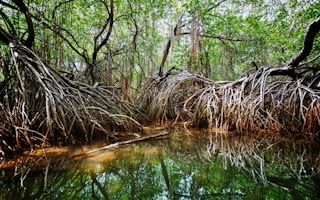British scientists have once again made the commercial case for conserving wilderness.
They have demonstrated that in its pristine state − mangrove swamps, wetlands, savannahs, forests and so on − nature left alone is of more value to humankind than as exploited real estate.
This argument has been made already, and more than once. But this time the researchers can provide the detail for their argument: they report in the journal Nature Sustainability that they had devised an accounting methodology to test such arguments, and then applied this in 24 selected sites around the planet.
Some of the value would be in intangibles such as providing a shelter for the wild things and wild plants; some of it would be measurable.
For instance, if the damage inherent in carbon spilled into the atmosphere through habitat destruction or fossil fuel combustion presents an overall cost to society of $31 a tonne − and this is a conservative estimate − then almost three quarters of the sample sites have greater value simply as natural habitats.
And that includes 100 per cent of all forests. If that greenhouse gas carbon was valued at a paltry $5 a tonne, almost two thirds of the sites would still be, over a 50-year period, a better investment left untouched.
“
At current levels of habitat conversion, conserving and restoring sites typically benefits human prosperity.
But what climate scientists now call “natural capital” − the invisible services provided by nature in crop pollination, water filtration and planetary air conditioning − is of measurable commercial value even without the vital role of carbon sink.
Of the 24 sites, 42 per cent would still be worth more in their natural form than converted to cropland.
“Stemming biodiversity loss is a vital goal in itself, but nature also fundamentally underpins human wellbeing,” said Richard Bradbury, of the University of Cambridge.
“We need nature-related financial disclosure, and incentives for nature-focused land management, whether through taxes and regulation or subsidies for ecosystem services.”
And his Cambridge co-author Andrew Balmford said: “Current rates of habitat conversion are driving a species extinction crisis unlike anything in human history. Even if you are only interested in dollars and cents, we can see that conserving and restoring nature is now very often the best bet for human prosperity.”
In fact the researchers made their conclusions based on 62 sites, but concentrated on 24 simply because in these cases they had the most reliable information about the potential commercial value of their sample against which to measure the value of restoring it, or protecting it, or both.
Valuable saltmarsh
If Nepal’s Shivapuri-Nagarjun National Park was turned from forest to farmland, investors would gain immediate capital from the value of the timber, and a longer-term income from crops.
But the loss of carbon storage would be 60 per cent, and the damage to water quality would be 88 per cent, and Nepal would be $11m worse off.
Even a saltmarsh near Preston in the United Kingdom proved to be worth $2000 a hectare in terms of its value in mitigating carbon emissions: no income from crops or forage grazing could match that.
That left 38 sites for which the economic data was less certain: even in these cases, the “goods and services” delivered by the site in its natural state was, for two-thirds of them, of more value to humankind as a whole than calculated exploitation by a few.
“Our findings indicate that, at current levels of habitat conversion, conserving and restoring sites typically benefits human prosperity,” the authors say.
This story was published with permission from Climate News Network.








